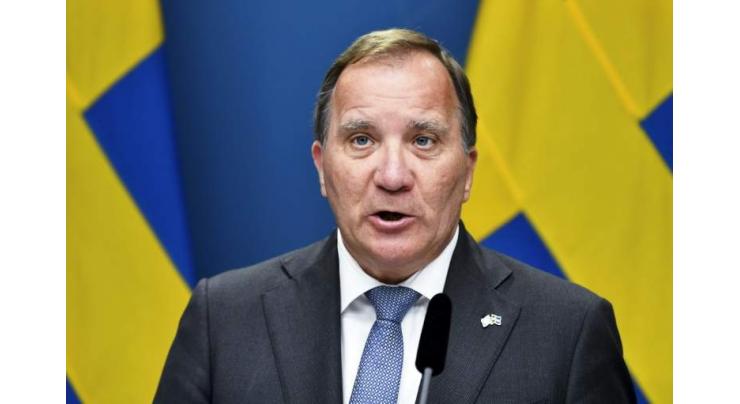
Sweden's Political Survivor Lofven Finally Stumbles
Umer Jamshaid Published June 21, 2021 | 08:17 PM

Prime Minister Stefan Lofven has weathered the decline of social democracy in Europe, the rise of the far right and even the Covid-19 pandemic, but he finally tripped up on Monday, losing a historic vote of no confidence in Sweden's parliament
Stockholm, (APP - UrduPoint / Pakistan Point News - 21st Jun, 2021 ) :Prime Minister Stefan Lofven has weathered the decline of social democracy in Europe, the rise of the far right and even the Covid-19 pandemic, but he finally tripped up on Monday, losing a historic vote of no confidence in Sweden's parliament.
The 63-year-old Lofven, a former welder and union leader with the square build and nose of a boxer, guided the Swedish left back to power in 2014, and then hung on by moving his party closer to the centre right after the 2018 elections.
A master of consensus for some, a dull and visionless party man for others, he finally fell out with the Left Party propping up his government, becoming the first Swedish government leader to be defeated by a no confidence vote.
"Sweden is in a difficult political situation, a very difficult one," Lofven told a press conference following his defeat.
He has a week to choose between elections or resignation.
It may however be too early to count out the man who emerged victorious from elections deemed lost in 2018, and it's possible his negotiating skills could forge a new majority.
Born in Stockholm in 1957, poverty forced his single mother to give him up when he was 10 months old to a foster family in Solleftea, 500 kilometres (310 miles) north of the capital, where his foster father was a factory worker.
He became a welder and spent 15 years in a defence factory, and head of the metal workers' union from 2006 to 2012.
- 'Houdini' - While the traditional left struggled in Europe -- only six social democratic or socialist heads of government remain in the 27-member EU -- Lofven managed to stay on top, even though he confused supporters by moving to the right, earning a reputation as a "right-wing socialist".
"Stefan Lofven could go down in history for his inventiveness and willingness for sacrifices to keep the Social Democrats in power," political commentator Ewa Stenberg wrote in Dagens Nyheter newspaper at the weekend.
"The Prime Minister has survived many crises," Stenberg said, adding that he now faces his greatest test so far.
"He now needs to do the political equivalent of what escape artist Harry Houdini did over a hundred years ago," she said, stressing several seemingly impossible political knots had to be untied.
While controversial, the decision to mitigate the Covid-19 pandemic with mainly non-coercive measures was not what weakened.
In fact, the Swedish strategy, promoted by state epidemiologist Anders Tegnell, boosted his ratings in opinion polls, even as the death toll rose to over 14,000 in the country of 10.3 million people, a far worse toll than in Nordic neighbours.
- Challenging the Swedish model - The political crisis erupted on Thursday when the Left Party, which has propped up the government in parliament, said it was ready to support a motion of no confidence against the prime minister, even if it meant mixing votes with those of the right-wing parties and the far-right Sweden Democrats.
The reason was a preliminary plan to reform rent controls, potentially freeing landlords to set rents for new apartments.
On the left, the proposal is considered at odds with the Swedish social model and a threat to tenants' rights.
While having become accustomed to threats from the Left Party, which until now have never materialised, Lofven was trapped as he also felt bound by a deal signed with two centre-left parties, the Centre Party and the Liberals.
The deal included proposals for liberal market reforms which irked the Left Party, and secured power for the Social Democrats but it was also seen as a move to the right.
And it reminded people of another perceived lurch to the right in November 2015, when the government abruptly closed the doors to most immigrants after Sweden had already taken in hundreds of thousands of refugees, notably from Syria.
Related Topics
Recent Stories

Tennis: ATP Barcelona Open results - 1st update

Swiatek's perfect 10 in Stuttgart as Vondrousova stuns Sabalenka

Arandu's roads closed due to flooding

Oil tanker catches fire in Islamabad’s Blue Area

Pakistan committed to ensure safety of foreign nationals: FO

Tennis: WTA Stuttgart results - 1st update

Four passengers injured as train hit an empty vehicle

Over- speeding bus crushed to death two bike riders

Turkey's Freedom Flotilla ready to set sail for Gaza

French teen dies from heart failure after knife attack near school

Iranians appear unfazed by Isfahan blasts

UAF celebrates Int'l Chinese Language Day
More Stories From World
-
Togo lawmakers approve contested political reform
2 hours ago -
NATO must choose 'whether we indeed are allies': Zelensky
2 hours ago -
US House to vote on Ukraine, Israel, Taiwan aid package
2 hours ago -
Calls for calm after reported Israeli strike on Iran
3 hours ago -
IMF calls on EU to deepen single market integration to boost growth
3 hours ago -
Second Ecuadoran mayor killed ahead of anti-crime referendum: police
3 hours ago
-
Oil, gas drilling blocked in Alaska wilds as Biden seeks green cred
4 hours ago -
Man sets self on fire outside Trump trial
4 hours ago -

Turkey's Freedom Flotilla ready to set sail for Gaza
5 hours ago -

French teen dies from heart failure after knife attack near school
5 hours ago -

Iranians appear unfazed by Isfahan blasts
5 hours ago -

Ecuador mayor killed ahead of anti-crime referendum: police
6 hours ago



